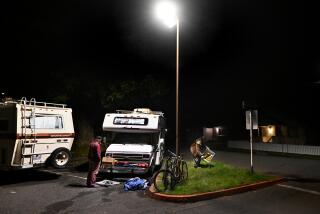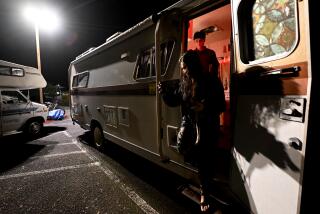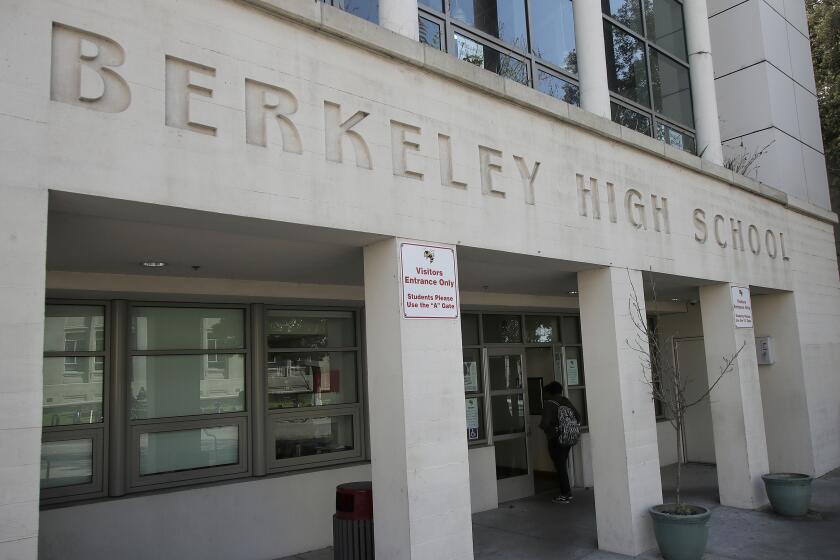For some students, college is their only safe haven. Now they have just days to leave
Marie Tano, 21, found a sanctuary when she arrived to study at Pomona College from a small town in Georgia. For the first time, she didn’t have to worry about money, her food was taken care of, and she had access to healthcare, therapy and the support she needed to do well in school.
“Pomona is really a safe haven for me,” she said.
Now, her security has been taken away. In response to the new coronavirus, the college, like others throughout the country, has asked students to leave campus and not expect to return for the remainder of the semester as the school shifts to online classes.
It has made an exception for some, but not all. Students who petitioned to stay, but were rejected, said they are feeling anxiety and fear about the future as the Wednesday deadline to leave campus approaches.
Colleges and universities across the country are grappling with the difficult question of whether to let students stay in campus housing or send them home. Campus officials want to downsize their densely populated dorms and classrooms to protect against the risk of spreading the infectious disease. But they also must balance those concerns against the fact that some students may not have access to shelter, food or Wi-Fi and see their campus as a safer space to stay.
The University of California’s nine undergraduate campuses plan to keep both dorms and dining facilities open to students who need them — although they are urging those who can, to safely go home.
UC Merced, where two-thirds of its 8,800 students are low-income, has told all students who need to stay that they are welcome to do so —and plans to continue its basic needs services, such as food and rent assistance. The campus also has emergency funds available for needy students — those who lose jobs, for instance. For students who are returning home and lack technology for online learning, Merced has supplied loaner laptops and “hot spots” for remote connection to Wi-Fi.
“We have made these decisions to ensure that our students have access to the resources they need to continue their education as we move our instructional delivery online,” said Charles Nies, vice chancellor for student affairs.
UCLA also will continue to serve its students on campus as needed. But all dining halls and quick-service restaurants have become “to-go” operations with meals served in take-out containers.
“We recognize that university housing could be a student’s permanent home, and not all students can leave,” campus spokesman Ricardo Vazquez said. “Housing, Dining and Residential Life are here for any student who needs to stay in their unit to complete their spring quarter.”
Many smaller institutions such as Pomona have responded somewhat differently, requiring students to leave campus unless approved to stay via a petition process. While student protests over the issue have roiled Pomona, the process has unfolded more smoothly at neighboring Claremont McKenna College, a fellow member of the five-campus Claremont Colleges.
Among 1,184 Claremont McKenna students living in campus housing, about 200 petitioned to stay and about 85 received approval to do so. That included all international student applicants, who face potential health risks and visa problems if they leave the country, said Dianna Graves, assistant vice president and dean of students. Some domestic students, such as those who are homeless or in fragile health, also were approved to stay, she said. The college is closing dining facilities but will provide food service for students who remain on campus.
Graves said the top concern of those who petitioned to stay involved technology – access to the internet or securing sufficient data on their phone plans. The college was able to meet those needs by providing enhanced internet and data plans, loaner laptops and iPads, VPN connections and other services, Graves said.
College officials made a point to check in with every single student with a personal phone call, Graves said.
Still, many students have been emotionally devastated by the abrupt end to their school year. One student came to her office sobbing about leaving, Graves said. But the college needed to be mindful of government health guidelines recommending social distancing, a practice that is counter to the school’s intimate classes, crowded dining facilities and shared dorms and bathrooms, she said.
“Our goal throughout this response has been to acknowledge the significant personal losses while offering support to get through this,” she said.
At Pepperdine University in Malibu, about 1,000 students requested permission to continue living on campus. About 200 will do so, more than half of them international students. University officials were able to help the other students get home safely by providing financial support from donor gifts for flights and gas — or a safe place to live temporarily, said Connie Horton, vice president for student affairs.
At Pomona, school officials said in a statement that they are “working with students around the clock to help find housing and travel options for the move off-campus” officials said in a statement.
The school says it will continue to pay student employees, help cover travel costs, provide Wi-Fi hot spots and laptops, and provide room and board refunds for students, moves that other private colleges have made nationwide.
But some say those efforts fall short of addressing the most significant effects of returning home for students who come from poverty, abuse and other situations that make them vulnerable at home. And they say school officials have not offered them clear communication and guidance about the process.
Student advocates with the group FLI Scholars, the acronym for first-generation and low-income students at Pomona College, surveyed 135 students who petitioned to stay on campus. The self-reported data indicate that 70% were denied, they said. School officials did not respond to questions about how many students had applied to stay and how many were accepted or rejected.
In their letter to students, officials said that they would “not be able to accommodate every student who requests to stay on campus while also doing our part to limit the spread of the virus.”
Those who remain on campus will move to designated residence halls in order to consolidate limited services and to “maintain reasonable workloads for employees in housekeeping and elsewhere,” officials said.
Petitions to stay were reviewed on a case-by-case basis, taking into consideration family structures, immigration issues, financial issues, geography and health concerns, officials said. Some students said they are trying to appeal the decisions, though there’s been little guidance on how to do so.
Tano said she is still hopeful the school will reconsider its rejection of her petition. For now, she’s making plans to stay with alumni in Los Angeles. But, she said, “I feel really desperate to remain on campus.”
Going home to Georgia, is not an option, she said. Her father is older, and she worries about making him sick. And she wouldn’t have the resources she needs to finish her classwork. She also has a history of health problems and her doctors and therapists are near campus. She said she is struggling to understand how a school with significant resources cannot accommodate more students.
“The school has made me feel like a burden,” she said. “This is a school with a $2-billion endowment.”
On Monday, as calls to limit public gatherings grew around the country, Pomona officials said there was even more urgency to get people off the campus.
“Good public health practice dictates that we quickly reduce the number of people on Pomona’s campus as much as possible,” officials said in a statement. “We strongly urge students who can leave before Wednesday to do so.”
More to Read
Start your day right
Sign up for Essential California for news, features and recommendations from the L.A. Times and beyond in your inbox six days a week.
You may occasionally receive promotional content from the Los Angeles Times.








